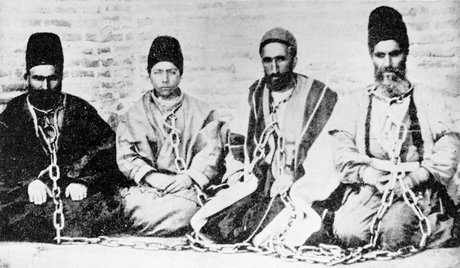 Editor’s Note: The following it the third and final portion of last Saturday’s publication in Publico, Portugal’s popular newspaper. The first two portions were published ipw1 and ipw2
Editor’s Note: The following it the third and final portion of last Saturday’s publication in Publico, Portugal’s popular newspaper. The first two portions were published ipw1 and ipw2
By Publico
Baha’is have been persecuted in Iran since the religion was founded in 1844, but the Islamic Revolution of 1979 seems to have made the extinction of this community – some three hundred thousand people – one of their ideological goals, by denying them the most basic human rights.
The persecutions began with the Bab, the first prophet of this religion, who was arrested several times before he was shot in 1850. His successor, Baha’u’llah, was also arrested and forced into exile, eventually dying in Ottoman Palestine in 1892. For Shiite Muslims of Iran, the idea that there could be “messengers of God” after Muhammad was a “heresy”.
If the Baha’is[1] were responsible for some revolts against the Qajar dynasty, including an attempt to assassinate Nasir al-Din Shah in 1852, under Baha’u’llah they adopted a philosophy of obedience and loyalty to the government. The new religion continued, however, to be seen as a threat to theology (and politics) of Shia Islam.
From 1917 to 1979, under the reign of the first Pahlavi Shah, Reza Khan[2], the Baha’is were not allowed to have their own schools and Baha’i civil servants were demoted or fired. Marriages of Baha’is were not recognized – the couples could be arrested for adultery, and the children were considered to be “illegitimate”.
With the coming to power of Ayatollah Khomeini, the Baha’is were charged with “association with the Shah’s regime, cooperation with the Shah’s secret police, SAVAK, opposition to the Islamic revolution, and spying for Israel.”
To the charge of being “heretics” and “enemies of Islam”, Baha’is remind us that their faith is recognized as an independent religion, even by some Muslim jurists. To the charge of being “agents of Zionism”, they insist that it is based on the fact that their prophet, Baha’u’llah, is buried on [the vicinity of] Mount Carmel, where he died after being forced into exile – when Israel did not exist – and that their International Headquarters (“Universal House of Justice”) works in Haifa. To the charge of being “involved in prostitution,” they say that the rituals of their marriages are still not recognized, and so Baha’i women are treated by government as “prostitutes”. As for allegations of “adultery and immorality”: they see these as a refusal to accept a religion that advocates equality between men and women, and which does not accept segregation of the sexes.
Since the 1979 Islamic revolution, at least 200 Baha’is have been killed or executed in Iran, over and above the twenty thousand victims of persecution beginning 150[3] years ago.
Notes by IPW:
[1] Actually the Babis – followers of the Bab, not Baha’is – followers of Baha’u’llah.
[2] Reza Shah Pahlavi ruled Iran from 1925 to 1941; his son Muhammad-Reza Pahlavi ruled from 1941 to 1979.
[3] Actually, 165 years ago.
Read the article in Portuguese here: Bahá’i (2)-Article on Publico, Portugal 9-19-09
September 27, 2009 2:46 am
The eternal story here is that love of God exalts His servants, whatever their surroundings. However, the acts of their self-chosen enemies provide a dark contrast that clarifies the scene for even the heedless. Two comments from vastly different levels are Abdu’l-Baha’s statement in England that a certain minister was presenting his hatred of Man as love of God, and Humphrey Bogart’s line in a movie, “These are the kind of people who kick out your teeth and then accuse you of mumbling”.